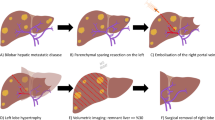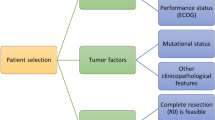Opinion statement
Biliary malignancies, although rare, can be some of the most challenging to manage surgically. Intrahepatic cholangiocarcinomas are resectable if there is no evidence of metastatic disease. These tumors are managed with anatomic resection and portal lymphadenectomy when centrally located or multiple in a single lobe. Non-anatomic resection can be performed for solitary peripheral tumors with minimally invasive techniques. It is not our practice to routinely employ neoadjuvant chemotherapy prior to resection of these tumors. Hepatic arterial infusion chemotherapy is utilized at our institution in highly selected patients in the context of an ongoing clinical trial for unresectable tumors. Hilar cholangiocarcinomas, when resectable (i.e., ipsilateral arterial involvement or lack of vascular involvement), are managed with right or left (extended) hepatectomy, caudate resection, and portal lymphadenectomy. Distal cholangiocarcinomas are managed with pancreaticoduodenectomy. Neoadjuvant chemotherapy is not routinely used in our treatment algorithm of extrahepatic cholangiocarcinomas. Nodal involvement and positive margin (R1) resection necessitates adjuvant chemotherapy. Finally, gallbladder carcinoma is managed with radical cholecystectomy, anatomic segment IVb/V resection, and portal lymphadenectomy. Adjuvant chemotherapy is employed routinely amongst patients with T2 or higher tumors and those with positive lymph nodes.

Similar content being viewed by others
References and Recommended Reading
Le VH, O’Connor VV, Li D, et al. Outcomes of neoadjuvant therapy for cholangiocarcinoma: a review of existing evidence assessing treatment response and R0 resection rate. J Surg Oncol. 2020:1–8. https://doi.org/10.1002/jso.26230.
Bartolini I, Risaliti M, Fortuna L, et al. Current management of intrahepatic cholangiocarcinoma: from resection to palliative treatments. Radiol Oncol. 2020;54(3):263–71.
Bartsch F, Eberhard J, Ruckert F. Repeated resection for recurrent intrahepatic cholangiocarcinoma: a retrospective German multicenter study. Liver Int. 2021;41:180–91.
Jung P, Cho EH, Kim SB, et al. Comparison of the clinical results of surgical resection for extrahepatic cholangiocarcinomas: hilar cholangiocarcinoma and mid-to-distal cholangiocarcomina. Ann Hepatobiliary Pancreat Surg. 2019;23:319–26.
Cidon EU. Resectable cholangiocarcinoma: reviewing the role of adjuvant strategies. Clin Med Insights Oncol. 2016;10:43–8.
Huang XT, Huang CS, Li JH, et al. Evaluating the adequacy of nodal status in node negative gallbladder cancer with T1b–T2 stages: use of nodal staging score. HPB. 2020;S1365-182x(20):31163–1. https://doi.org/10.1016/j.hpb.2020.09.018 Online ahead of print.
AlMasri S, Nassour I, Tohme S, et al. Long-term survival following minimally invasive extended cholecystectomy for gallbladder cancer: a 7-year experience from the National Cancer Database. J Surg Oncol. 2020;122:707–15.
Bohan PMK, Kirby DT, Chick RC, et al. Adjuvant chemotherapy in resectable gallbladder cancer is underutilized despite benefits in node-positive patients. Ann Surg Oncol. 2020. https://doi.org/10.1245/s10434-020-08973-x.
Buyyounouski M, Choyke P, Kattan M, et al. AJCC cancer staging manual. 8th ed. Chicago: Springer; 2017. p. 317–25.
Chen Y, Xu Y, Zhang Y. Current status of laparoscopic radical hilar cholangiocarcinoma in Mainland China. Biosci Trends. 2020;14(3):168–73.
Wu R, Zhang G, Feng J, et al. Proposal of the optional numbers of examined and positive lymph nodes to the 8th edition of American Joint Committee on Cancer (AJCC) staging for 758 patients with distal cholangiocarcinoma. PLoS ONE. 2020;15(6):e0234464. https://doi.org/10.1371/journal.pone.0234464.
Nitta N, Ohgi K, Sugiura T, et al. Prognostic impact of paraaortic lymph node metastasis in extrahepatic cholangiocarcinoma. World J Surg. 2021;45(2):581–9.
He M, Xu X, Feng H, et al. Regional lymphadenectomy vs. extended lymphadenectomy for hilar cholangiocarcinoma (Relay-HC trial): study protocol for a prospective, multicenter, randomized controlled trial. BMC. 2019;20:528. https://doi.org/10.1186/s13063-019-3605-z.
Anderson B, Doyle MBM. Surgical considerations of hilar cholangiocarcinoma. Surg Oncol Clin N Am. 2019;28:601–17.
Bhutiani N, Scoggins CR, McMasters KM, et al. The impact of caudate lobe resection on margin status and outcomes in patients with hilar cholangiocarcinoma: a multi-institutional analysis from the US Extrahepatic Biliary Malignancy Consortium. Surgery. 2018;163:726–31.
Tran TB, Ethun CG, Pawlik TM, et al. Actual 5-year survivors after surgical resection of hilar cholangiocarcinoma. Ann Surg Oncol. 2019;26:611–8.
Ebata T, Mizuno T, Yokoyama Y, et al. Surgical resection for Bismuth type IV perihilar cholangiocarcinoma. BJS. 2018;105:829–38.
Kaneoka Y, Yamaguchi A, Isogai M, et al. Survival benefit of hepatopancreatoduodenectomy for cholangiocarcinoma in comparison to hepatectomy or pancreatoduodenectomy. World J Surg. 2010;34:2662–70.
Sakamoto Y, Nara S, Kishi Y, et al. Is extended hemihepatectomy plus pancreaticoduodenectomy justified for advanced bile duct cancer and gallbladder cancer? Surgery. 2013;153:794–800.
Shimizu A, Motoyama H, Kubota K, et al. Safety and oncological benefit of hepatopancreatoduodenectomy for advanced extrahepatic cholangiocarcinoma with horizontal tumor spread: Shinshu University experience. Ann Surg Oncol. 2020;28(4):2012–25. https://doi.org/10.1245/s10434-020-09209-8 Online ahead of print.
Toyoda T, Tm Ebata, Mizuno T, et al. Cholangiographic tumor classification for simple patient selection prior to hepatopancreatoduodenectomy for cholangiocarcinoma. Ann Surg Oncol. 2019;26:2971–9.
Coimbra FJF, Torres OJM, Alikhanov, et al. Brazilian Consensus on Incidental Gallbladder Carcinoma ABCD. Arq Bras Cir Dig. 2020;33(1):e1.
Lundberg O, Kristoffersson A. Port site metastases from gallbladder cancer after laparoscopic cholecystectomy. Results of a Swedish survey and review of published report. Eur J Surg. 1999;165:215–22.
Z’Graggen K, Birrer S, Maurer CA, Wehrli H, et al. Incidence of port site recurrence after laparoscopic cholecystectomy for preoperatively unsuspected gallbladder carcinoma. Surgery. 1998;124:831–8.
Hu JB, Sun XN, Xu J, et al. Port site and distant metastases of gallbladder cancer after laparoscopic cholecystectomy diagnosed by positron emission tomography. World J Gastroenterol. 2008;14:6428–31.
Weiland ST, Mahvi DM, Niederbuger JE, et al. Should suspected early gallbladder cancer be treated laparoscopically? J Gastrointest Surg. 2002;6:50–6.
Zhang WJ, Xu GF, Zou XP, et al. Incidental gallbladder carcinoma diagnosed during or after laparoscopic cholecystectomy. World J Surg. 2009;33:2651–6.
Maker AV, Butte J, Oxenberg J, et al. Is port site resection necessary in the surgical management of gallbladder cancer? Ann Surg Oncol. 2012;19:409–17.
Fuks D, Regimbeau JM, Pessaux P, et al. Is port-site resection necessary in surgical management of gallbladder cancer? J Visc Surg. 2013;150(4):277–84.
Lee W, Jeong C, Jang J, et al. Do hepatic-sided tumors require more extensive resection than peritoneal-sided tumors in patients with T2 gallbladder cancer results of a retrospective multicenter study. Surgery. 2017;162(5):515–24.
Lee H, Choi DW, Park JY, et al. Surgical strategy for T2 gallbladder cancer according to tumor location. Ann Surg Oncol. 2015;22:2779–86.
Park TJ, Ahn KS, Kim YH, et al. The optimal surgical resection approach for T2 gallbladder carcinoma: evaluating the role of surgical extent according to the tumor location. Ann Surg Treat Res. 2018;94:135–41.
Kwon W, Kim H, Han Y, et al. Role of tumor location and surgical extent on prognosis in T2 gallbladder cancer: an international multicenter study. BJS. 2020;107:1334–43.
Lafaro K, Blakely AM, Melstrom LG, et al. Prognostic impact of tumor location in resected gallbladder cancer: a national cohort analysis. J Surg Oncol. 2020;122:1084–93.
National Comprehensive Cancer Network. Hepatobiliary Cancers (Version 5.2020). Accessed January 10, 2021.
Le Roy B, Gelli M, Pittau G, et al. Neoadjuvant chemotherapy for initially unresectable intrahepatic cholangiocarcinoma. BJS. 2018;105:839–47.
Riby D, Mazzotta AD, Bergeat D, et al. Downstaging with radioembolization or chemotherapy for initially unresectable intrahepatic cholangiocarcinoma. Ann Surg Oncol. 2020;27:3729–37.
Baltatzis M, Jagatheeswaran S, Siriwardena A. Neoadjuvant chemoradiotherapy before resection of perihilar cholangiocarcinoma: a systematic review. Hepatobiliary Pancrea Dis Int. 2020;19:103–8.
Cloyd JM, Prakash L, Vauthey JN, et al. The role of preoperative therapy prior to pancreatoduodenectomy for distal cholangiocarcinoma. Am J Surg. 2019;218:145–50.
Katayose Y, Nakagawa K, Yoshida H, et al. Neoadjuvant chemoradiation therapy for cholangiocarcinoma to improve R0 resection rate: the first report of phase II study. J Clin Oncol. 2015;33:402.
Gerhards M, Gonzalez Gonzales D, ten Hoopen-Neumann H, et al. Prevention of implantation metastases after resection of proximal bile duct tumors with pre-operative low-dose radiation therapy. Eur J Surg Oncol. 2000;26:480–5.
Primrose JN, Fox RP, Palmer DH, et al. Capecitabine compared with observation in resected biliary tract cancer (BILCAP): a randomized, controlled, multicenter phase 3 study. Lancet. 2019;20(5):663–73.
Shroff RT, Kennedy EB, Bachini M, et al. Adjuvant therapy for resected biliary tract cancer: ASCO Clinical Practice Guideline. J Clin Oncol. 2019;37:1015–27.
Ben-Josef E, Guthrie KA, El-Khoueiry AB, et al. SWOG S0809: A phase II intergroup trial of adjuvant capecitabine and gemcitabine followed by radiotherapy and concurrent capecitabine in extrahepatic cholangiocarcinoma and gallbladder carcinoma. J Clin Oncol. 2015;33:2617–22.
Itano O, Takemura Y, Kishida N, et al. A prospective feasibility study of one-year administration of adjuvant S-1 therapy for resected biliary tract cancer in a multi-institutional trial (Tokyo Study Group for Biliary Cancer: TOSBIC01). BMC Cancer. 2020;20:688–96.
Bergeat D, Turrini O, Courtin-Tanguy L, et al. Impact of adjuvant chemotherapy after pancreaticoduodenectomy for distal cholangiocarcinoma: a propensity score analysis from a French multicentric cohort. Lagenbecks Arch Surg. 2018;403:701–9.
Shi X, Zhang J, Tian H, et al. Role of adjuvant (chemo)radiotherapy for resected extrahepatic cholangiocarcinoma: a meta-analysis. JZUS. 2020;21(7):549–59.
Bohan PMK, Kirby D, Chick RC, et al. Adjuvant chemotherapy in resectable gallbladder cancer is underutilized despite benefits in node-positive patients. Ann Surg Oncol. 2021;28:1466–80.
Cai YL, Lin YX, Xiong XZ, et al. Postsurgical radiotherapy in stage IIIB gallbladder cancer patients with one to three lymph node metastases: a propensity score matching analysis. Am J Surg. 2020.https://doi.org/10.1016/j.amjsurg.2020.08.007.
Rahnemai-Azar A, Abbasi A, Tsilimigras D, et al. Current advances in minimally invasive surgical management of perihilar cholangiocarcinoma. J Gastrointest Surg. 2020;21:2143–9.
Chen Y, Xu Y, Zhang Y. Current status of laparoscopic radical hilar cholangiocarcinoma in Mainland China. Biosci Trends. 2020;14:168–73.
Kang SH, Choi Y, Lee W, et al. Laparoscopic liver resection versus open liver resection for intrahepatic cholangiocarcinoma: 3-year outcomes of a cohort study with propensity score matching. Surg Oncol. 2020;33:63–9.
Ratti F, Rawashdeh A, Cipriani F, et al. Intrahepatic cholangiocarcinoma as the new field of implementation of laparoscopic liver resection programs. A comparative propensity score-based analysis of open and laparoscopic liver resections. Surg Endosc. 2020. https://doi.org/10.1007/s00464-020-07588-3.
Kinoshita M, Kanazawa A, Takemura S, et al. Indications for laparoscopic liver resection of mass-forming intrahepatic cholangiocarcinoma. Asian J Endosc Surg. 2020;13:46–58.
Guerrini GP, Esposito G, Tarantino G, et al. Laparoscopic versus open liver resection for intrahepatic cholangiocarcinoma: the first meta-analysis. Lagenbeck’s Arch Surg. 2020;405:265–75.
Martin SP, Drake J, Wach M, et al. Laparoscopic approach to intrahepatic cholangiocarcinoma is associated with an exacerbation of inadequate nodal staging. Ann Surg Oncol. 2019;26:1851–7.
Shiraiwa DK, Carvalho PFDC, Maeda CT, et al. The role of minimally invasive hepatectomy in hilar and intrahepatic cholangiocarcinoma: a systematic review of the literature. J Surg Oncol. 2020;121(5):863–72.
Martin SP, Drake J, Wach MM, et al. Laparoscopic approach to intrahepatic cholangiocarcinomas is associated with exacerbation of inadequate nodal staging. Ann Surg Oncol. 2019;26:1851–7.
Cercek A, Boerner T, Tan BR, et al. Assessment of hepatic arterial infusion of floxuridine in combination with systemic gemcitabine and oxaliplatin in patients with unresectable intrahepatic cholangiocarcinoma: a phase 2 clinical trial. JAMA Oncol. 2020;6(1):60–7.
Higaki T, Aramaki O, Moriguchi M, et al. Arterial infusion of cisplatin plus S-1 against unresectable intrahepatic cholangiocarcinoma. Biosci Trends. 2018;12(1):73–8.
Author information
Authors and Affiliations
Corresponding author
Additional information
Publisher's Note
Springer Nature remains neutral with regard to jurisdictional claims in published maps and institutional affiliations.
This article is part of the Topical Collection on Upper Gastrointestinal Cancers
Rights and permissions
About this article
Cite this article
Washington, K., Rocha, F. Approach to Resectable Biliary Cancers. Curr. Treat. Options in Oncol. 22, 97 (2021). https://doi.org/10.1007/s11864-021-00896-3
Accepted:
Published:
DOI: https://doi.org/10.1007/s11864-021-00896-3




